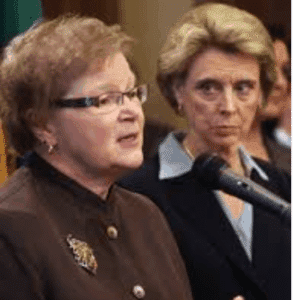
Notes From Olympia: March 19, Week 10 of the 2021 Legislative Session
In this Week’s Notes from Olympia: Revenue Updates, Bill Roundup, and Catching Up with Secretary (Ret.) Selecky
Trivia!
In Capitol speak, what is a “guber?” (Hint, it’s not a type of candy you can purchase at the Dome Deli)
Revenue Updates/Budget Proposals Expected Next Week
On Wednesday, the state’s Economist Dr. Stephen Lerch provided the Economic and Revenue Forecast Council with an updated revenue forecast.
On the positive side, revenue continues to outpace projections, with nearly $3.3 billion more than forecasted expected over four years. This represents a $1.34 billion increase in revenue for the current 2019-21 biennium and a $1.949 billion increase for the upcoming 2021-23 biennium. Despite plummeting revenues in 2020 following the stay-at-home order, our state is nearly back to the pre-pandemic revenue numbers that were projected in February 2020.
These projections are aided by four factors: 1) passage of a series of federal stimulus packages; 2) a faster than expected vaccine distribution process; 3) a hot real estate and construction market; and 4) strong retail sales aided by people reinvesting their stimulus checks back into the economy.
On the negative side, since the November forecast there has been slightly slower than expected employment growth; rising oil and gasoline prices; and continued weakness in business sectors such as restaurants, the arts and entertainment. Not surprisingly, the largest risk to this forecast continues to be COVID, particularly the risk associated with the virus variants.
Members of the Economic and Revenue Forecast council include the Senate Ways and Means Chair Senator Christine Rolfes and House Appropriations Chair Timm Ormsby and many of the media questions were directed at these lead budget writers. In his remarks, Representative Ormsby stressed that while this forecast is positive news, there remains great uncertainty and emphasized the economic gains are not felt by all Washingtonians. Representative Ormsby discussed his priority of getting dollars (particularly the federal stimulus funds coming to the state) into the hands of those who need the resources most.
Office of Financial Management Director David Schumacher shared that Washington is slated to receive $4.2 billion in federal funding from the American Rescue Plan Act (there are other buckets of funding coming to the state), including for child care and local governments. Senator Rolfes shared budget writers are still working through details of the federal package and questions remain as the state is still awaiting federal guidance on a number of spending areas. Senator Rolfes stressed the importance of staying the course and ensuring the state’s commitments can continue to be met in the long-term when these one-time funds sunset.
Senate Republican lead budget writer Senator Lynda Wilson carried her caucus’ message that with this forecast, there are ample resources to meet the state’s commitments and extend supports to families, such as funding the Working Families Tax Credit. She shared her preference that reducing taxes, including property taxes, could benefit families and the economy. House Republican council member Representative Ed Orcutt urged that the work of the Tax Structure Workgroup conclude before any new revenue is enacted.
Now that the revenue numbers are known, Senate and House budget writers will be making final tweaks to their proposed budgets. Because of the complexity with the federal ARPA dollars, budgets will be released a little later than usual this year. The Senate is slated to release its budget on March 25th with a public hearing scheduled for public comment on Friday, March 26th in Senate Ways and Means beginning at 1:00 p.m. The Senate organizes their public comment hearings by issue area, with early learning listed third in the order. Rumor is the House will release its budget on March 26th with a hearing on Saturday, March 27th.
Bill Roundup
Update on Fair Start for Kids Act Bills. Both the Senate (E2SSB 5237) and House (E2SHB 1213) versions of the Fair Start for Kids Act bills continue to advance. E2SSB 5237 received a public hearing in the House Children, Youth and Families Committee on Thursday, March 18th and E2SHB 1213 will be heard in the Senate Early Learning and K-12 Committee on Monday, March 22nd with a vote scheduled on the House bill on Wednesday, March 24th and a vote on the Senate bill on either March 24th or 25th. As of this writing, there has not been a decision as to which bill will serve as the final vehicle.
As a reminder, an analysis of both bills as well as a side-by-side comparison can be found on the resources page of the Start Early Washington website.
DCYF Licensing Bill Advances to House Appropriations. On Wednesday, the House Children, Youth and Families approved SSB 5151, DCYF’s licensing bill. The bill contains a number of provisions. In terms of early learning, the bill waives child care licensing fees until June 30, 2023 and makes the outdoor preschool pilot program permanent. The bill next moves to the House Appropriations Committee for consideration.
Capital Gains. On Monday, the House Finance Committee held a public hearing on ESSB 5096, the Capital Gains measure. As described in previous updates, the intent is that the first $350 million raised from this new revenue source will be deposited into the Education Legacy Trust Account with a focus on supporting child care and early learning. It has not yet been scheduled for a vote.
On Deck Next Week
Senate Ways and Means Work Session on Federal Dollars. While not technically next week, the Senate Ways and Means Committee will hold a hearing at 2:30 today (Friday, March 19th) where they will receive a briefing on details of the American Rescue Plan Act (ARPA). As noted above, at Wednesday’s Revenue Forecast Council, Senate Ways and Means Chair Senator Christine Rolfes shared there are still a lot of questions and budget writers are still working through details of the federal package, but they do plan to include as many of the federal dollars as possible in the proposed budgets that will be released next week sometime.
It’s Cutoff Time Again. Two cutoffs are quickly approaching with the opposite house policy committee cutoff on Friday, March 26th and the opposite house fiscal committee cutoff quickly thereafter on Friday, April 2nd. It is hard to believe we are nearly 2/3 done with this legislative session. The last few weeks will be a flurry of final bill and budget negotiations.
Early Learning Facilities Bill to Receive Hearing. On Monday, ESHB 1370 will be heard in the Senate Ways and Means Committee. This bill would make improvements to the existing Early Learning Facilities program and rename the funds after former Representative Ruth Kagi. It is scheduled for a vote on Thursday, March 25th.
Start Early Luncheon April 22nd
Our biggest event of the year, the Start Early Annual Luncheon, is going virtual on April 22! You are invited to join us in celebration of the transformational power of starting early through inspiring stories from families, educators, corporate leaders and early learning advocates, including Former First Lady Michelle Obama and Clinton Boyd Jr., a national leader on social equity and parent engagement. Learn more and register.
Trivia Answers
In Capitol lingo, a “guber” is the nickname for the approval process for gubernatorial appointees.
Our state’s Governor has the authority to appoint scores of people to positions ranging from directors of state agencies to specific boards and commissions. Some of these appointments require Senate approval, just like a piece of legislation. Gubernatorial appointments that require Senate confirmation start with a hearing in the appropriate policy committee, followed by a committee vote and then consideration by the full Senate. These Senate approvals are not on a set schedule and if you are following an appointment you have to stay on your toes, because the Senate will often run “gubers” with little notice when they have lulls in their floor activity (case in point detailed below).
Recently, our state’s new Director of Health, Dr. Umair Shah, had his confirmation hearing virtually in the Senate Health & Long-Term Care Committee. In his opening remarks, Dr. Shah noted he had big shoes to fill for the position following the service of the previous two Secretaries, Dr. John Wiesman and Mary Selecky.
I am fortunate to work with Mary Selecky and I asked her if she would be willing to be interviewed to talk about her confirmation process and her 14 years of service as the Secretary of the Department of Health. Mary kindly agreed and she shared wonderful stories and insights into her experience. Full disclosure – we could have talked for hours and I hung up realizing I neglected to ask ¾ of my questions, including getting her thoughts on the pandemic and other pressing public health issues.
The Path to Leading a State Agency. For 20 years, Mary served as the Administrator of the Northeast Tri-County Health District, headquartered in Colville. She loved that role and loves her community. As a Health District Administrator, she was active in state-level work (known for being the voice for rural communities), helping to establish an independent Department of Health in the 1980s.
When the Secretary of Health position became open at the state level in the late 1990s, applying for the position was not on her radar. She was eventually convinced to assume the role of Acting Secretary in 1998 while then Governor Locke continued a search for a permanent Secretary. During her time as Acting Secretary, she maintained her Administrator job, going back and forth between Olympia and Colville (a practice she would continue). She called this her “public health mission.” Six months into her role as Acting Secretary, she was persuaded to apply for the permanent role and Governor Locke formally appointed Mary to the Secretary position on the “Ides of March” in 1999.
As I mentioned above, approval of “gubers” are not always scheduled with advance notice. When Mary’s came up, she was fortunately already at the Capitol. She was kneeled down, making a budget pitch to a Senator who was seated on a couch when someone alerted her to go to the gallery to watch her confirmation.
This was before cell phones were prevalent, so Mary sat in the Senate Gallery by herself, listening to Senators’ speeches supporting her appointment. She recalled that the joke afterwards was that people took away that Mary is “a nurse, a sister and a Quaker” because of comments made by Senators speaking in support of her confirmation. Former Senator Rosa Franklin called her a sister and fellow University of Pennsylvania alum Senator Tim Sheldon made the Quaker comment (the Penn mascot).
Stay Connected and Stay Local. After Mary assumed the role of Secretary, she continued to return to Colville, although her visits switched to twice a month and she realized that Colville had become the “suitcase part of her life.” Mary said she undertook this eight-hour drive because she felt it was important to get out of the Olympia bubble and the I-5 corridor and get the grounding of being home.
Mary spoke of being in the grocery store and having a neighbor speak to her about how the area’s lead mines were impacting the groundwater, leading to lead appearing in the neighbor’s carrot crop. Not information she would naturally pick up in Olympia! These continued relationships and connections allowed her to more seamlessly transition when her time as Secretary concluded when she retired in 2013 and returned to Colville.
The Importance of Support. When Mary was first appointed Secretary of the Department of Health in 1999, there were only four female Cabinet members. When Governor Gregoire was elected in 2004, she added more women to the Cabinet. Governor Gregoire set out to build a culture where the female Cabinet members supported each other both personally and professionally. They often had dinner together at restaurants in Olympia and at times Governor Gregoire would herself join. Mary shared that at one Cabinet meeting, the female Cabinet members decided to each incorporate some form of Cheetah print into their attire. Their male colleagues did not notice and, when alerted, they responded by wearing blue dress shirts at a future Cabinet meeting.

Governor Gregoire and Secretary Mary Selecky at a press conference. Given the serious look on Governor Gregoire’s face, this may have been around the time the Seattle Times ran a three-day series “Licensed to Harm” that led to reforms of the state’s licensing of medical professionals that Mary oversaw.
It is not a surprise that Mary paid this culture of camaraderie and support forward. The current Speaker of the House Laurie Jinkins worked as Mary’s Assistant Secretary at the Department of Health. Mary was proud to sit in the gallery when Speaker Jinkins was sworn in and be introduced as a friend and mentor.
Final Reflections. Mary continues to be very active in local, regional, state and national work. She is the current chair of Empire Health Foundation in Eastern Washington, sits on two Providence boards and is very active in her Rotary. In fact, her local youth Rotary group (Interact) honored Mary in March as a local person who puts service above self. As a fellow Rotarian, I can attest that Mary exemplifies the Rotary motto.
Mary remains engaged in state activity and I suspect her phone rings a lot with people seeking her counsel. I will end with a personal story. On the day Speaker Jinkins was sworn in as Speaker, I had the pleasure of having coffee with Mary and another colleague in the infamous Dome Deli at the Capitol. We were hardly able to finish a sentence because a never-ending line of people wanted to chat with Mary. It was like being with a Hollywood movie star!

Secretary Selecky at a school anti-smoking rally (note her shirt says “No Stank You”)
Thank you, Mary, for your continued service to Washington state and for sharing some of these amazing stories.
About the Author

Erica Hallock
Director, Policy & Advocacy, Start Early Washington
Erica Hallock serves as the Director of Policy and Advocacy for Start Early Washington. She has worked in early childhood, health and human services policy in both California and Washington state.
